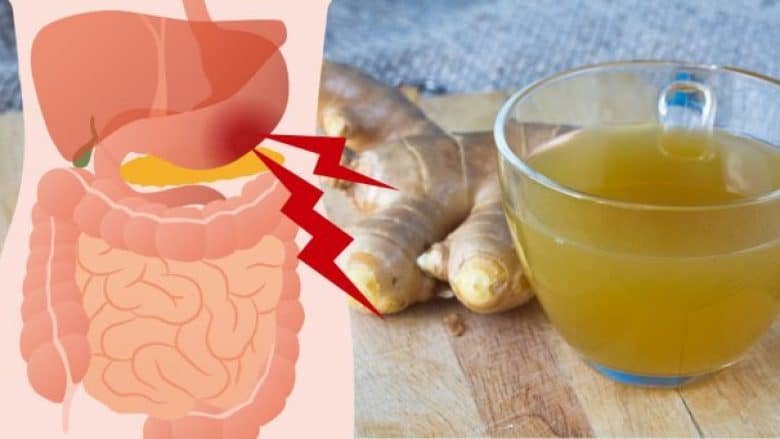1.Eases Digestive Discomfort and Enhances Gut Health
Ginger tea is best known for its ability to soothe the digestive system. The active compounds in ginger, such as gingerol and shogaol, stimulate gastrointestinal motility—the rate at which food moves through the stomach and intestines. This helps prevent food from lingering in the gut, reducing the risk of bloating, gas, and constipation245.
Ginger tea is also highly effective against nausea. Clinical research shows that ginger can relieve various forms of nausea, including morning sickness during pregnancy, motion sickness, and nausea related to chemotherapy246. Even the American Academy of Obstetrics and Gynecology recommends ginger as a safe, nonpharmaceutical remedy for nausea and vomiting in pregnancy2.
2.Reduces Inflammation Throughout the Body
Chronic inflammation is at the root of many health problems, including arthritis, heart disease, and metabolic disorders. Ginger contains over 400 natural compounds, many of which have potent anti-inflammatory properties235. Gingerol, in particular, has been shown to inhibit inflammatory pathways, helping to reduce swelling and pain in conditions like osteoarthritis and rheumatoid arthritis1789.
Regular consumption of ginger tea may help manage inflammatory symptoms and support overall joint and tissue health58.
3.Provides Powerful Antioxidant Protection
Ginger is rich in antioxidants—compounds that protect cells from oxidative stress and damage caused by free radicals45911. These antioxidants, including gingerol and shogaol, help lower the risk of chronic diseases such as cancer, cardiovascular disease, and neurodegenerative disorders459.
Drinking ginger tea regularly can boost your body’s natural defenses, helping to maintain cellular health and slow the aging process59.
4.Supports Heart and Metabolic Health
Emerging research suggests that ginger tea can have a positive impact on heart health. Studies indicate that ginger may help lower blood pressure, improve cholesterol profiles, and support healthy blood sugar levels—key factors in reducing the risk of cardiovascular disease and type 2 diabetes57810.
-
: Daily ginger consumption has been linked to a decreased risk of hypertension57.
-
: Ginger may help lower LDL (“bad”) cholesterol and increase HDL (“good”) cholesterol8.
-
: Ginger has been shown to improve glycemic control and insulin sensitivity in people with type 2 diabetes, helping to regulate blood sugar spikes178.
5.Relieves Pain, Including Headaches and Menstrual Cramps
Ginger tea is a natural pain reliever, thanks to its anti-inflammatory and analgesic properties. Research shows that ginger can help reduce the severity and duration of headaches, migraines, and muscle soreness after exercise5678.
For women, ginger tea is especially beneficial for relieving menstrual pain (dysmenorrhea). Multiple studies and systematic reviews have found that ginger is as effective as some over-the-counter pain medications for reducing menstrual cramps, but with fewer side effects167.
6.Boosts Immunity and Fights Infections
Ginger’s antimicrobial and immune-boosting properties make ginger tea a valuable ally during cold and flu season. The antioxidants and phytonutrients in ginger help strengthen the immune system, making it easier for the body to fend off infections49.
Ginger tea may also help soothe sore throats, reduce coughing, and ease congestion, making it a popular home remedy for colds and respiratory infections45.
7.Aids Weight Management and Appetite Control
Ginger tea may support healthy weight management through several mechanisms. Research suggests that ginger can help control appetite, increase thermogenesis (the body’s calorie-burning process), and promote fat breakdown58.
Regular consumption of ginger tea, as part of a balanced diet and healthy lifestyle, may help reduce body weight, body mass index (BMI), and waist-to-hip ratio578. These effects are likely due to ginger’s ability to enhance metabolism and regulate hormones involved in hunger and satiety.
8.Promotes Overall Well-Being and May Protect Against Chronic Disease
Beyond its specific actions, ginger tea contributes to overall wellness. Its antioxidant, anti-inflammatory, and metabolic benefits combine to lower the risk of chronic diseases, support cognitive function, and promote longevity78911.
Researchers are also exploring ginger’s potential neuroprotective, antineoplastic (anti-cancer), and liver- and kidney-protecting effects, although more human studies are needed to confirm these benefits8.
How to Make and Enjoy Ginger Tea
Making ginger tea is simple:
-
: Peel and slice a 1–2-inch piece of fresh ginger. Add to 2 cups of boiling water, simmer for 10–15 minutes, strain, and enjoy.
-
: Use according to package instructions.
-
: Add lemon, honey, or a cinnamon stick for extra taste and benefits.
Ginger tea can be enjoyed hot or cold, at any time of day. Many people find it especially soothing first thing in the morning or after meals to aid digestion5.
Potential Side Effects and Precautions
Ginger tea is generally safe for most people when consumed in moderate amounts. However:
-
Some may experience mild side effects such as heartburn, bloating, or stomach irritation, especially at higher doses56.
-
Ginger contains salicylates, which can thin the blood. People on blood thinners or with bleeding disorders should consult a healthcare provider before drinking ginger tea regularly69.
-
Pregnant or breastfeeding women should consult their doctor before using ginger to manage nausea or other symptoms46.
Conclusion
Drinking ginger tea is a simple, delicious way to support your health on multiple fronts. From soothing digestion and reducing inflammation to boosting immunity and supporting heart health, the benefits of ginger tea are both wide-ranging and well-supported by scientific research. Whether you’re seeking relief from everyday ailments or aiming to protect your long-term wellness, a daily cup of ginger tea can be a powerful, natural addition to your routine.
:
- https://pmc.ncbi.nlm.nih.gov/articles/PMC7019938/
- https://www.hopkinsmedicine.org/health/wellness-and-prevention/ginger-benefits
- https://www.ncbi.nlm.nih.gov/books/NBK92775/
- https://www.medicalnewstoday.com/articles/ginger-tea-benefits
- https://www.bbcgoodfood.com/health/nutrition/health-benefits-ginger-tea
- https://www.healthline.com/health/food-nutrition/ginger-drink-morning
- https://pmc.ncbi.nlm.nih.gov/articles/PMC9170469/
- https://pubmed.ncbi.nlm.nih.gov/36688554/
- https://www.health.harvard.edu/nutrition/the-health-benefits-of-3-herbal-teas
- https://www.health.harvard.edu/staying-healthy/health-benefits-of-ginger-and-simple-ways-to-incorporate-this-zesty-root-into-your-diet
- https://www.verywellhealth.com/benefits-of-ginger-8731069
- https://pubmed.ncbi.nlm.nih.gov/31935866/
- https://pubs.rsc.org/en/content/articlelanding/2021/fo/d0fo02834g
- https://pubmed.ncbi.nlm.nih.gov/38944033/
- https://www.mccormickscienceinstitute.com/our-research/scientific-overviews/msi-funded-paper-potential-health-benefits-of-ginger







